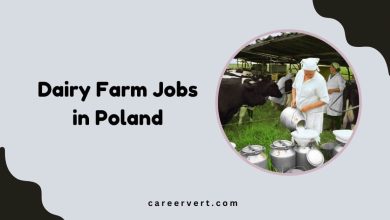Visa Sponsorship Agriculture Jobs in Poland for Foreigners 2024

The Rural Industry in Poland provides intriguing business opportunities that entice individuals to explore a variety of professional experiences. The development and collection of fungi is a frequent obligation of these positions, which are essential to the success of Poland’s rural sector.
The influx of outside laborers into Poland may be significantly influenced by visa sponsorship. This simultaneously alleviates the labor deficit and promotes cross-cultural trade and collaboration. Poland’s willingness to accept talented and productive individuals from all corners of the world is exemplified by the supported visas.
As a consequence of the expanding global and household markets for mushrooms, Poland has experienced a significant increase in labor requirements. Gifted faculty members are necessary to execute labor-intensive tasks, including sorting, pressing, and selecting. Individuals who have prior rural experiences and those who are interested in hands-on training in mushroom cultivation and management may both find employment in this sector. The mushroom development industry offers opportunities for both temporary and long-term business due to the consistent labor demands that peak during harvest seasons.
Details of Agriculture Jobs in Poland:
| Country | Poland |
| Job | Agricultural Jobs |
| Education | High School Diploma |
| Experience | 2-3 Years |
| Visa Sponsorship | Yes |
Key areas in agriculture:
The subsequent list comprises the most agricultural regions and their associated obligations:
Agriculture of crops:
The cultivation of various commodities may be considered a creation that encompasses their generation, development, and promotion. It necessitates specific agricultural sciences knowledge, apparatus capabilities, and equipment. Precipitation, rural item costs, cultivation apparatus, and labor are among the numerous variables that influence a farmer’s salary.
Agriculture of fruits:
Fruit cultivation encompasses the cultivation of vines, small trees, and natural products. A few natural product ranches have small plantations where the ranchers cultivate fresh produce that they harvest at various locations throughout the year. At farmers’ markets or neighborhood grocery stores, this product is available from numerous ranchers. The following are the most natural products for this type of cultivation:
- berries, including blackberries, raspberries, and cherries
- melons, including cantaloupes
- natural citrus products, including oranges and lemons
- nuts, including pistachios and walnuts
Agriculture:
Horticulture is the cultivation of plants in gardens to provide sustenance or pharmaceuticals. It encompasses the management of plant materials to ensure their proper development, reproduction, and health through consideration, determination, and assistance. This is contingent upon the unique attributes of each type of tree, shrub, or bloom. You will be able to secure cultivation in both natural and conventional methods, contingent upon your preferences.
Livestock husbandry:
Livestock cultivation encompasses the breeding and nurturing of animals to produce meat, milk, and eggs for commercial purposes. Animals provide a diverse array of material materials, including hide, fiber, and stowaways. It creates a pathway for the utilization of crop byproducts and other materials.
Farming poultry:
The propagation of chickens and other poultry is a component of poultry cultivation. Ranchers have access to a diverse selection of poultry breeds that are available for commercial purposes. For instance, commercial egg-laying hens are frequently observed laying eggs within a poultry coop, where they necessitate conventional care, food, and water. Daily, a rancher provides support to the chickens, treats them when they are weakened, and retrieves the eggs for sale.
Apiculture:
Bee cultivation involves the maintenance of honey bees in bee sanctuaries to produce nectar, propolis, and other products. Beekeeping can be conducted on a variety of scales, ranging from a small domestic bee sanctuary on a terrace to a large commercial operation, depending on the beekeeper’s objectives. At the recreational level, you will engage in beekeeping to either support your connection to science or to generate income from honey or other products.
Aquaculture:
The breeding and rearing of sea-going life forms in water, including angels, mollusks, shellfish, and oceanic vegetation, is referred to as aquaculture. A cultivator can collect mollusks and angles in the wild and house them in walled-in areas with the help of aquaculture. Aquaculture also encompasses coordinate culture or mariculture, which employs fish eggs, juvenile organisms, or vegetation of oceanic origin.
Agroforestry:
Agroforestry is a management framework in which trees are grown on farmland in conjunction with produce and livestock. This approach integrates agricultural and ranger services to advance environmental sustainability and ensure food security. To prevent soil disintegration and provide shade for crops or livestock, farmers can plant trees as windbreaks or walls in agroforestry. Additionally, these trees can enhance soil quality by avoiding soil compaction, increasing organic matter, and adding supplements.
Check Also: Potato Crisps Production Jobs in Poland – Visa Sponsorship
Aquaponics:
Aquaponics may be a framework that combines the cultivation of aquatic organisms and vegetation in a harmonious environment. It integrates aquaculture, which is the cultivation of oceanic life forms such as angle, mollusks, and shellfish, with hydroponics, which is a potential approach to the cultivation of plants in water or sediment. In this framework, the water is directed from angle containers and subsequently pumped into the hydroponic system.
Energy farming:
Energy cultivation involves the utilization of renewable energy sources, including biofuel, solar, wind, and geothermal regulation. This type of farming is characterized by the utilization of renewable energy sources and the reduction of waste emissions. It provides a means to generate energy and support agriculture in numerous regions where conventional farming is not feasible due to hilly terrain, the necessity for soil supplements, or inclement weather.
Agriculture Laborer Requirements:
- Assisting with common cultivate work
- Operating cultivate machinery
- Maintaining and repairing cultivated buildings and machinery
- Maintaining farm records
- Carrying out creature cultivation duties
Agriculture Laborer Duties:
- Planting and harvesting produce
- Maintaining livestock
- Maintaining and operating agricultural apparatus
- Upkeep and repair of agricultural structures and fences
- The application of pesticides and manure
- Editing the welfare of creatures and monitoring their activity
Benefits of Visa Sponsorship Agriculture Jobs in Poland for Foreigners:
- Legal Right to Work: Visa sponsorship guarantees that foreign workers are lawfully permitted to engage in employment in Poland, thereby safeguarding them from legal complications associated with unauthorized employment.
- Pathway to Residency: The acquisition of a visa sponsorship for an agricultural position can serve as an initial stage in the process of applying for temporary or permanent residency in Poland, particularly for long-term employment contracts.
- Stable Employment: The demand for labor is consistently high, particularly in sectors such as fruit and vegetable farming, which means that agricultural occupations provide a consistent source of income.
- Training and Skill Development: Employment in Poland’s agricultural sector may result in the acquisition of new farming techniques, equipment operation, and European agricultural practices.
- European Union Access: Foreign workers employed in Poland have the potential to experience free movement within the Schengen Area, which encompasses 26 European countries. This enables them to easily travel and explore throughout Europe.
- Health and Social Benefits: Jobs that involve visa sponsorship frequently include access to Poland’s health and social security benefits, such as healthcare, pensions, and unemployment assistance.
- Culture Experience: Working in Poland offers the chance to immerse oneself in the local culture, language, and lifestyle, which can have a positive impact on both personal and professional life.
- Long-Term Employment Potential: The process of visa sponsorship can result in long-term employment, which provides stability and the potential to renew the work visa or transition to other sectors.
- Poland provides competitive: wages for foreign laborers, with some employers also providing accommodation and meals, even though wages in agriculture may vary.
Application Strategy for Agrarian Jobs:
Apply for this position through the connection given below.
Frequently Asked Questions:
-
What is the agricultural salary in Poland?
The average farm worker’s gross salary in Poland is 51 604 zł or an equivalent hourly rate of 25 zł. In addition, they earn an average bonus of 521 zł. The salary estimates are derived from salary survey data that was directly collected from employers and anonymous employees in Poland.
-
How do I get a job as a foreigner in Poland?
To get a work permit, your potential employer must fill out a work permit application that includes the name of the company you are recruiting and your future job description within that company. If you have succeeded in getting a job offer in Poland, then your employer has to apply for a work permit on your behalf.
-
Is Poland open to foreign workers?
However, foreign workers are required to have the proper visas and work permits in Poland, as established by immigration laws. Candidates must obtain the EMPLOYMENT VISA (NATIONAL VISA, D TYPE) through the closest Polish consulate in their country.



